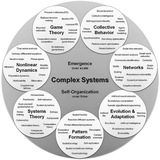#Postdoc Researcher – Infectious Disease Dynamics: Mathematical Modelling
https://jobs.ethz.ch/job/view/JOPG_ethz_ZDYXd8lWMFY1rYF08k
https://jobs.ethz.ch/job/view/JOPG_ethz_ZDYXd8lWMFY1rYF08k
jobs.ethz.ch
Postdoctoral Researcher – Infectious Disease Dynamics: Mathematical Modelling
#job Data Scientist – Innovation team
100%, Zurich, fixed-term
https://jobs.ethz.ch/job/view/JOPG_ethz_HykyO5MlwVRsjOxrkD
100%, Zurich, fixed-term
https://jobs.ethz.ch/job/view/JOPG_ethz_HykyO5MlwVRsjOxrkD
jobs.ethz.ch
Data Scientist – Innovation team
Data-driven stability analysis of complex systems with higher-order interactions
https://www.nature.com/articles/s42005-025-02147-5
https://www.nature.com/articles/s42005-025-02147-5
Nature
Data-driven stability analysis of complex systems with higher-order interactions
Communications Physics - Stability analysis of complex dynamical systems is crucial across disciplines, impacting ecosystems and biological organs. Here, the authors introduce a data-driven method...
Vaccines have saved 154 million lives and counting, Nature reported in April. And vaccines are reaching new heights: the human papillomavirus (HPV) vaccine, for example, seems to prevent almost all cervical cancers.
https://www.nature.com/articles/d41586-025-00862-1
https://www.nature.com/articles/d41586-025-00862-1
Nature
154 million lives and counting: 5 charts reveal the power of vaccines
Nature - But public-health specialists worry that misinformation and funding cuts could affect vaccination rates.
Comparative evaluation of behavioral epidemic models using COVID-19 data
Modeling the interplay between human behavior and infectious disease transmission remains one of the key challenges in Epidemiology. In this study, we evaluate the performance of three mechanistic behavioral epidemic models designed to address this issue. We compare data-driven and analytical approaches across the first COVID-19 wave, spanning nine diverse locations and two modeling tasks. While the optimal model may vary depending on factors such as data availability and geography, our findings show that approaches explicitly modeling behavioral feedback mechanisms often outperform data-driven approaches, even when considering data quality and the increased numbers of free parameters of these models.
https://www.pnas.org/doi/10.1073/pnas.2421993122
Modeling the interplay between human behavior and infectious disease transmission remains one of the key challenges in Epidemiology. In this study, we evaluate the performance of three mechanistic behavioral epidemic models designed to address this issue. We compare data-driven and analytical approaches across the first COVID-19 wave, spanning nine diverse locations and two modeling tasks. While the optimal model may vary depending on factors such as data availability and geography, our findings show that approaches explicitly modeling behavioral feedback mechanisms often outperform data-driven approaches, even when considering data quality and the increased numbers of free parameters of these models.
https://www.pnas.org/doi/10.1073/pnas.2421993122
PNAS
Comparative evaluation of behavioral epidemic models using COVID-19 data | PNAS
Characterizing the feedback linking human behavior and the transmission of infectious
diseases (i.e., behavioral changes) remains a significant cha...
diseases (i.e., behavioral changes) remains a significant cha...
How AI chatbots are leading people into psychological crises
https://www.nytimes.com/2025/06/13/technology/chatgpt-ai-chatbots-conspiracies.html?unlocked_article_code=1.O08.LDNt.2bQkdsYH8sTH&smid=url-share
https://www.nytimes.com/2025/06/13/technology/chatgpt-ai-chatbots-conspiracies.html?unlocked_article_code=1.O08.LDNt.2bQkdsYH8sTH&smid=url-share
NY Times
They Asked ChatGPT Questions. The Answers Sent Them Spiraling. (Gift Article)
Generative A.I. chatbots are going down conspiratorial rabbit holes and endorsing wild, mystical belief systems. For some people, conversations with the technology can deeply distort reality.
